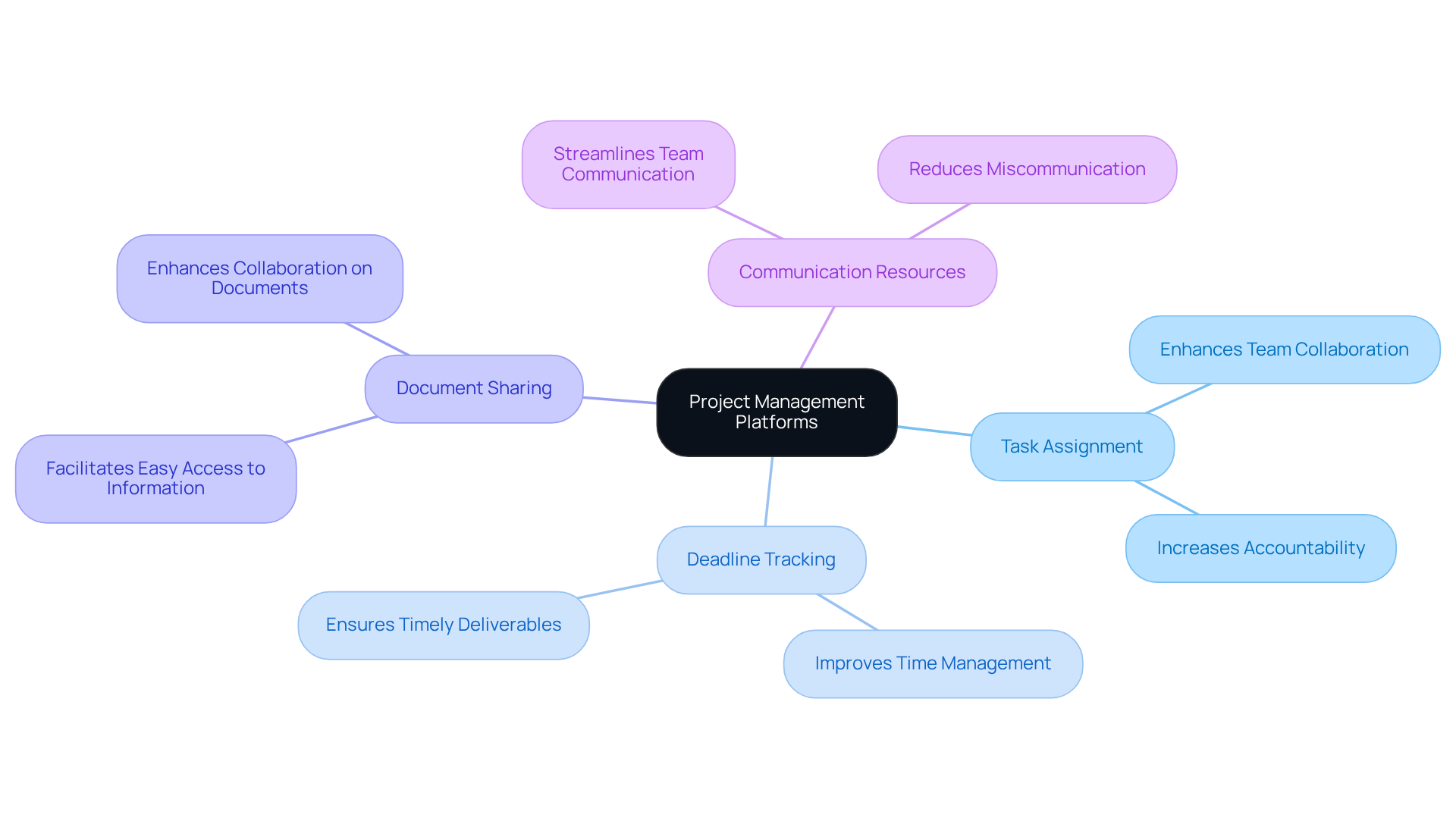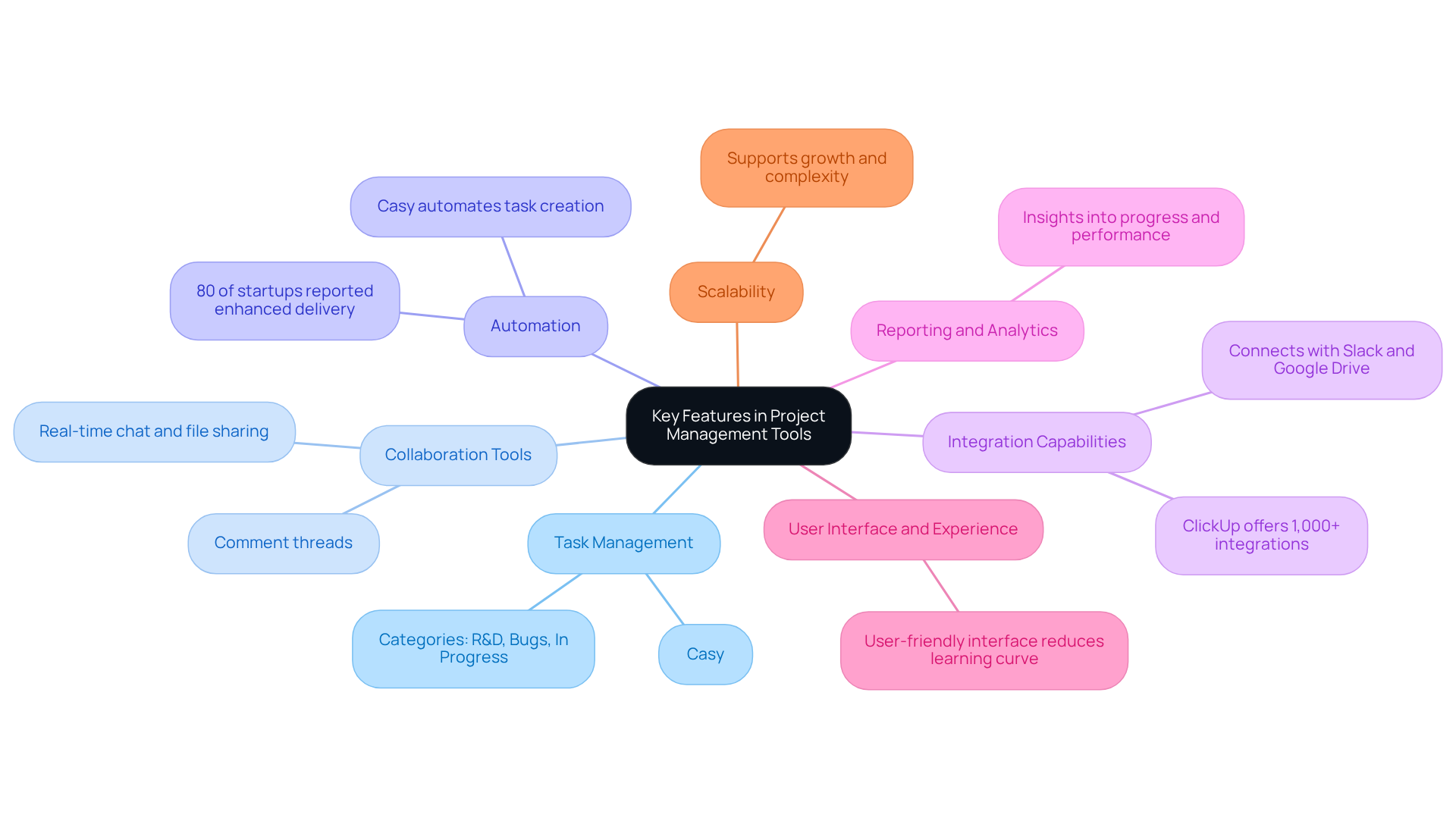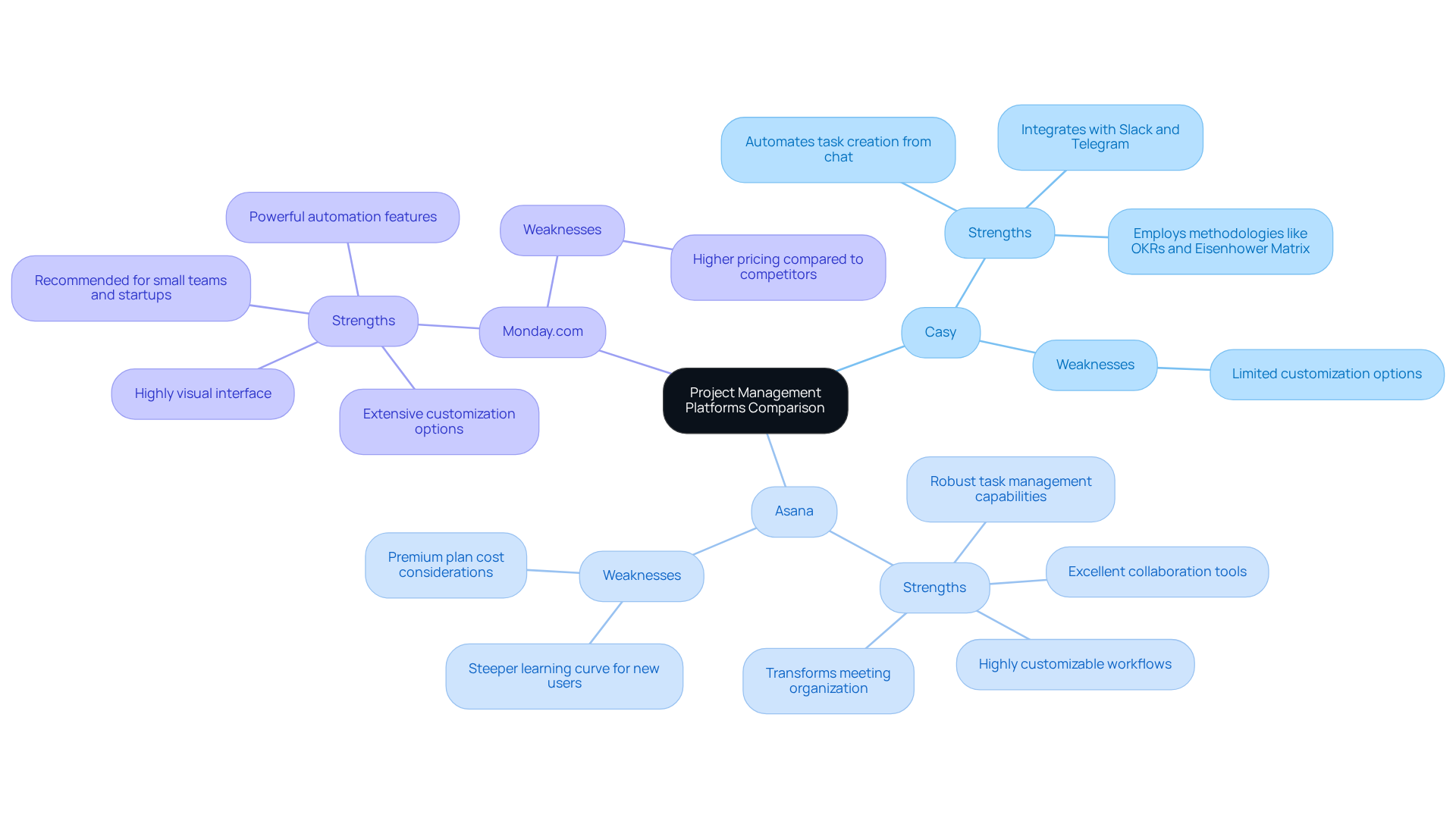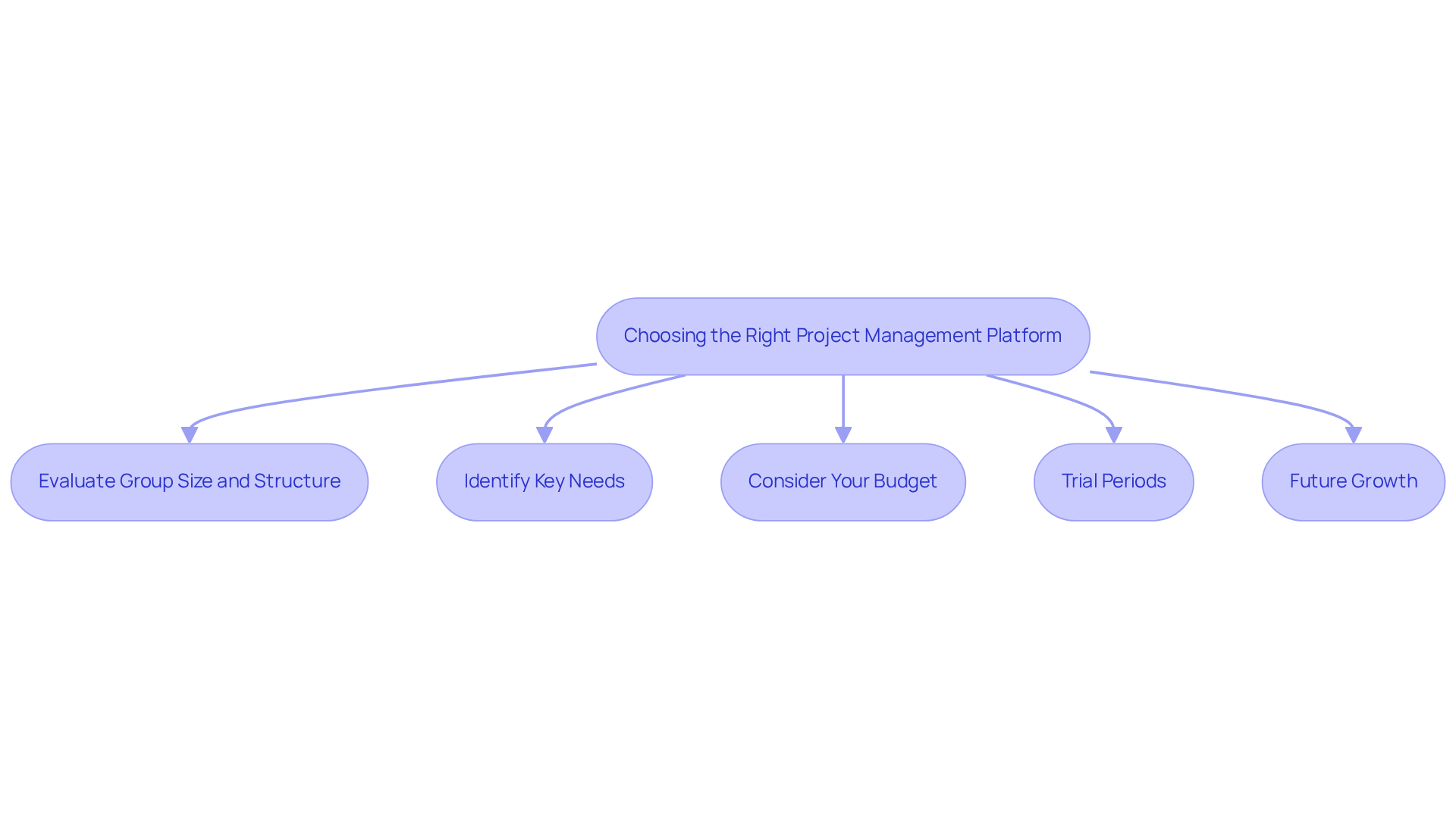Overview
This article offers a comparative analysis of project management platforms specifically designed for startups, underscoring the selection criteria and features that can significantly boost operational efficiency. It highlights essential platforms such as Casy, Asana, and Monday.com, detailing their respective strengths and weaknesses. Importantly, it stresses the necessity of evaluating factors such as team size, budget, and specific needs to select the most suitable tool for fostering growth and productivity.
Why is it crucial to choose the right platform? The right project management tool can streamline processes, enhance collaboration, and ultimately drive success. Startup founders face unique challenges, and understanding these platforms can empower them to make informed decisions.
As you consider your options, think about your team's size and budget. Are you looking for a platform that accommodates rapid scaling? Or perhaps one that offers robust features within a limited budget? Evaluating these factors will lead you to a tool that aligns with your operational goals.
In conclusion, the selection of a project management platform is not merely a logistical decision; it is a strategic one that can influence your startup's trajectory. By carefully assessing your needs and the available options, you can choose a tool that not only supports your current operations but also positions your startup for future growth.
Introduction
Selecting the right project management platform can be a pivotal decision for startups navigating the complexities of growth and innovation. As these emerging businesses strive to optimize their operations, understanding the unique features and benefits of various tools becomes essential. With an overwhelming array of options available, how can startups discern which platform aligns best with their specific needs and goals? This article embarks on a comparative analysis of leading project management platforms, offering insights into their strengths and weaknesses. It aims to guide startups toward making informed decisions that drive efficiency and ultimately lead to success.
Understanding Project Management Platforms
Essential software solutions like project management platforms streamline the planning, execution, and monitoring of projects. By facilitating effective collaboration, resource management, and progress tracking, these tools empower teams to achieve their goals efficiently. Key functionalities often include:
- Task assignment
- Deadline tracking
- Document sharing
- Communication resources
For new businesses operating in dynamic environments, the selection of the right management software can significantly impact both efficiency and the success of initiatives. Notably, the integration of automation and real-time collaboration features offers considerable advantages for startups striving to minimize operational overhead while maximizing productivity.
Have you considered how the right project management platforms could transform your operations? With the right tools, you can not only enhance team collaboration but also drive your projects to successful completion. As you navigate the complexities of startup life, remember that investing in effective project management platforms is not just beneficial—it's essential for sustainable growth.

Key Features to Consider in Project Management Tools
When evaluating project management tools, startups must prioritize several essential features:
-
Task Management: The ability to create, assign, and track tasks is fundamental. Look for tools that facilitate easy categorization and prioritization of tasks. For instance, Casy organizes tasks into categories such as R&D, Bugs, and In Progress, streamlining project oversight.
-
Collaboration Tools: Features like real-time chat, file sharing, and comment threads significantly enhance group communication. These tools foster a collaborative environment, crucial for team success.
-
Automation: Tools that automate repetitive tasks can save time and reduce errors. Casy exemplifies this by automatically generating tasks from chat conversations, allowing teams to focus on their core activities. This automation is vital; a 2025 survey revealed that 80% of startups utilizing project management platforms reported enhanced delivery, improved collaboration, and increased efficiency.
-
Integration Capabilities: The ability to connect with other applications, such as Slack or Google Drive, is essential for seamless workflows. This ensures that teams can operate effectively across various platforms.
-
Reporting and Analytics: Startups benefit from resources that provide insights into progress and performance, assisting in guiding future decisions.
-
User Interface and Experience: A user-friendly interface can significantly reduce the learning curve, enhancing adoption rates and making it easier for teams to engage with the tool.
-
Scalability: As new businesses expand, their project management needs will evolve. Selecting project management platforms that can grow alongside the team is crucial for supporting future growth and complexity.
Moreover, it's imperative for startups to avoid tools with unnecessary features that can lead to confusion and inefficiency, as noted by Ramona, an author and journalist. Casy stands out not only for its automation and task management capabilities but also for its commitment to data privacy and security, ensuring that user content remains secure and confidential.

Comparative Analysis of Leading Project Management Platforms
In this comparative analysis, we explore three prominent project management platforms, namely Casy, Asana, and Monday.com, each catering to different group needs and preferences.
-
Casy:
- Strengths: Casy excels in automating task creation directly from chat conversations, seamlessly integrating with platforms like Slack and Telegram. This automation significantly reduces administrative overhead, making it particularly advantageous for fast-moving groups that prioritize efficiency. Furthermore, Casy employs built-in methodologies such as OKRs and the Eisenhower Matrix to assist groups in efficiently prioritizing their tasks.
- Weaknesses: While Casy offers a streamlined experience, it has limited customization options compared to some competitors, which may restrict adaptability for groups with specific workflow requirements.
-
Asana:
- Strengths: Asana is renowned for its robust task management capabilities, excellent collaboration tools, and strong reporting features. Its highly customizable workflows empower groups to tailor the platform to their unique processes, enhancing overall productivity. User satisfaction ratings indicate that Asana has transformed meeting organization and reduced email volume, making it a preferred choice among many users.
- Weaknesses: However, Asana can become complex for new users, presenting a steeper learning curve that may impede immediate adoption for certain groups. Asana's Premium plan starts at $10.99 per user monthly, which could be a consideration for budget-conscious startups.
-
Monday.com:
- Strengths: Known for its highly visual interface, Monday.com offers extensive customization options and powerful automation features. This flexibility makes it suitable for groups that require a tailored approach to project management. Monday.com is particularly recommended for small teams and startups as one of the top project management platforms due to its intuitive design and adaptability.
- Weaknesses: Conversely, Monday.com’s pricing can be higher than other options, which may pose a challenge for smaller groups with limited budgets. The Starter plan for Monday.com is priced at €9/month/user when billed annually, potentially influencing decision-making for new businesses.
In summary, Casy is especially beneficial for new ventures that emphasize automation and minimal setup, while Asana and Monday.com offer more extensive features for groups willing to invest time in customization and training. User satisfaction ratings suggest that while Casy is favored for its simplicity, Asana and Monday.com are valued for their comprehensive features, making the decision primarily reliant on the specific requirements and capabilities of the group.

Choosing the Right Platform for Your Startup's Needs
Choosing the right project management platform for your startup requires careful consideration of several key factors:
-
Evaluate Your Group's Size and Structure: Smaller teams may benefit from simpler resources like Casy, which automate tasks and reduce administrative overhead. Have you assessed how your team's size impacts your project management needs?
-
Identify Your Key Needs: What is your primary focus—task automation, collaboration, or reporting? Clarifying your needs will help you narrow down your options effectively.
-
Consider Your Budget: It's essential to evaluate the pricing structures of different platforms. Some resources may offer free tiers or discounts for startups. Consider the accessible budget for technology development, which typically ranges from $15K to $50K. How does your budget align with your goals?
-
Trial Periods: Take advantage of free trials to assess the platforms with your team. This hands-on experience can reveal which tool aligns best with your workflow. Evaluating resources together before committing financially is crucial, as it significantly influences acceptance and efficiency.
-
Future Growth: Choose a platform that can scale alongside your business. As your team grows, your management requirements will evolve, and the right tool should support that growth.
By thoughtfully considering these factors, startups can select project management platforms that not only meet their current needs but also foster their future growth.

Conclusion
Selecting the right project management platform is a pivotal decision for startups looking to enhance operational efficiency and drive successful project outcomes. The appropriate tools not only facilitate collaboration and streamline processes but also significantly contribute to a startup's growth trajectory. By understanding the unique features and strengths of various platforms, entrepreneurs can make informed choices that align with their specific needs and objectives.
This analysis highlights key functionalities such as:
- Task management
- Collaboration tools
- Automation
- Scalability
These are essential elements for startups navigating the complexities of project execution. Platforms like Casy, Asana, and Monday.com each offer distinct advantages, catering to different operational preferences and budget constraints. While Casy excels in automation and simplicity, Asana and Monday.com provide robust customization and comprehensive features, making the selection process reliant on a startup's unique requirements.
Ultimately, choosing a project management platform should be strategic, rooted in a thorough evaluation of:
- Team size
- Budget
- Future growth potential
By taking the time to assess these factors and leveraging trial periods, startups can ensure they adopt a tool that not only meets their immediate needs but also supports their long-term aspirations. Embracing the right project management solution is not merely a matter of convenience; it is a crucial step towards fostering a collaborative, efficient, and successful business environment.
Frequently Asked Questions
What are project management platforms?
Project management platforms are essential software solutions that streamline the planning, execution, and monitoring of projects, facilitating effective collaboration, resource management, and progress tracking.
What key functionalities do project management platforms typically offer?
Key functionalities often include task assignment, deadline tracking, document sharing, and communication resources.
Why is selecting the right project management software important for new businesses?
The selection of the right management software can significantly impact efficiency and the success of initiatives, especially for new businesses operating in dynamic environments.
How do automation and real-time collaboration features benefit startups?
Automation and real-time collaboration features offer considerable advantages for startups by helping to minimize operational overhead while maximizing productivity.
How can project management platforms transform business operations?
The right project management platforms can enhance team collaboration and drive projects to successful completion, making them essential for sustainable growth.




